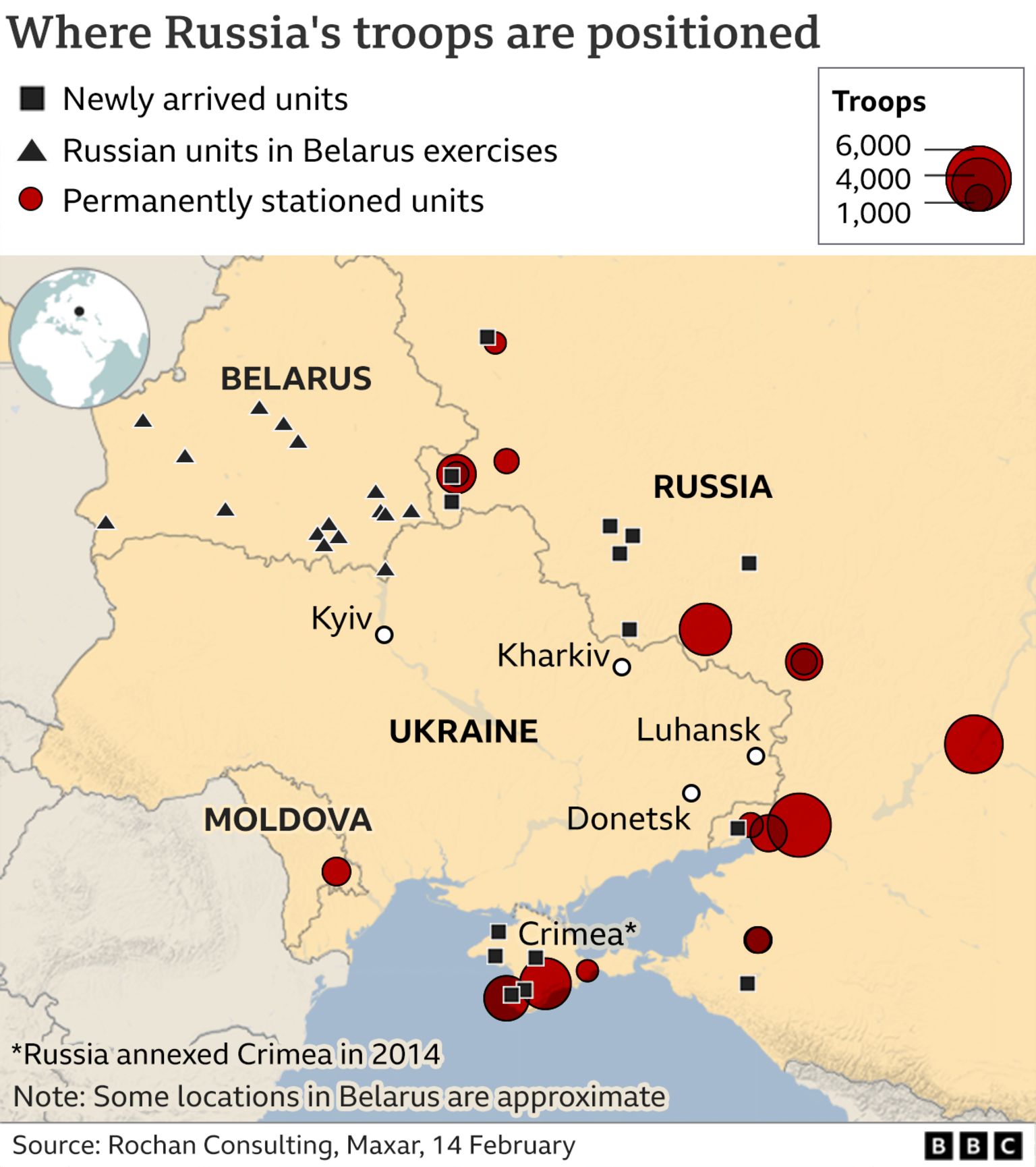Russia says it is pulling back some of its troops from near Ukraine after a build-up raised fears of an invasion.


The defence ministry said that large-scale drills continued but that some units were returning to their bases.
Ukraine warned to wait to see proof of the pull-out, saying “when we see the withdrawal, then we’ll believe the de-escalation”.
More than 100,000 Russian troops have massed at Ukraine’s border. Russia has always denied it is planning an attack.
The build-up has brought increasingly grave warnings, with the US saying an invasion could come at any time.
Russia has been seeking guarantees that Ukraine will not be allowed to join Nato, something the security bloc has rejected.
In another development, the Russian parliament has voted in favour of asking President Vladimir Putin to recognise the two self-declared republics of Luhansk and Donetsk in Eastern Ukraine as independent.
Russia has granted citizenship to at least 720,000 people in the two regions, the scene of an insurgency that began in 2014.
If Mr Putin were to recognise the two breakaway regions it would violate peace agreements.
- LIVE: Updates on the Ukraine-Russia tensions
- EXPLAINER: Is Russia preparing to invade Ukraine?
- ANALYSIS: Five ways out of conflict
- ON THE GROUND: A Ukrainian city unifies against Russia’s threats
In its statement, Russia’s defence ministry said it was withdrawing some of the troops conducting exercises in military districts bordering Ukraine.
“A number of combat training exercises, including drills, have been conducted as planned,” defence ministry spokesman Igor Konashenkov said.
Some exercises are continuing, such as a large joint Russia-Belarus drill, due to end on 20 February.
A British government source said it was waiting to see the scale of the withdrawal, saying it would have to make a difference to the ability to invade to be meaningful.https://emp.bbc.com/emp/SMPj/2.44.11/iframe.htmlMedia caption,Watch: Russia video appears to show tanks leaving Ukrainian border area
But the announcement was enough for both Ukraine and Russia to claim victory in the stand-off.
Ukraine’s Foreign Minister Dymytro Kuleba said “we have managed together with our partners to deter Russia from any further escalation”.
A Russian foreign ministry spokeswoman, Maria Zakharova, said the day “will go into history as the day western war propaganda failed. They have been disgraced and destroyed without a single shot being fired.”





For weeks there have been regular reports of Russia increasing troop numbers near the border with Ukraine.
Now Moscow has announced that – drills over – some units are returning to base.
A sign of de-escalation? Possibly. But caution is required. The number of troops packing up and moving back is unclear.
Moscow, of course, has insisted all along it has no plans for a military escalation in Ukraine. The Russian authorities have dismissed claims by Western governments that a Russian invasion is imminent.
President Putin’s spokesman said the Kremlin leader had mocked such assertions.
“Sometimes [Putin] even jokes about it,” Dmitry Peskov told journalists. “He asks us to check whether they [in the West] have published the exact time that war will start.”



Germany’s Chancellor Olaf Scholz is in Moscow for talks with President Putin as part of diplomatic efforts aimed at warding off a potential crisis.
Mr Scholz has faced criticism for his response to the tensions.
He has refused to commit publicly to scrapping the Nord Stream 2 gas pipeline connecting Russia and Germany in the event of Russian aggression against Ukraine, saying only that all sanctions options remain on the table.
This is in contrast to US President Joe Biden, who has said the scheme would be halted if Russia invades.
-BBC
